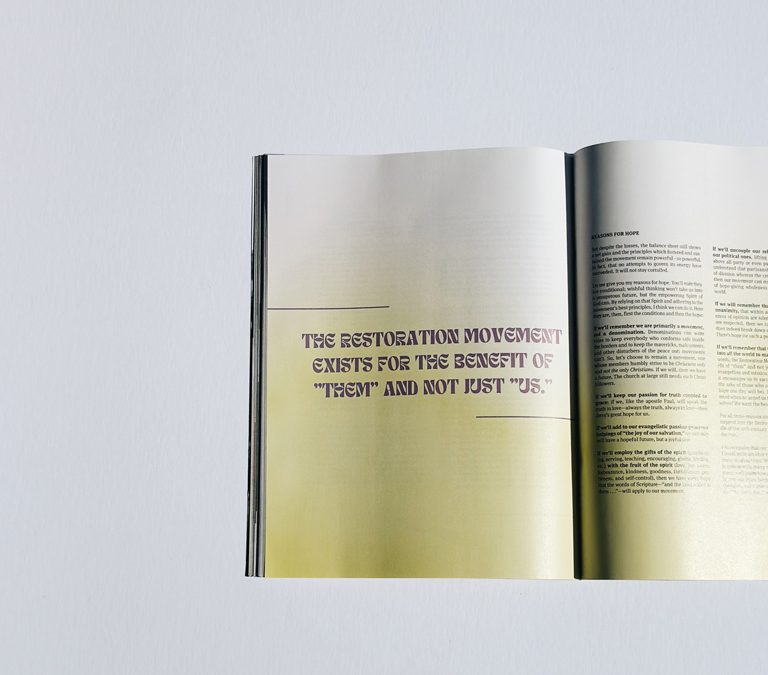By Dave Stone
When I was a little kid and would go outside to play, my parents would say to my brother and me, “Stay in our yard.” It was a loving effort to protect us. When we moved to a new house, my parents even went to the expense of having a fence installed around our backyard. They “claimed” it was because of our curious dog, but looking back, it probably had more to do with their two rambunctious sons. (Pretty wise on their part.)
When kids are immature and impressionable, parents are wise to lay out some boundaries and restrictions. The more mature my brother and I became, the more Mom and Dad would loosen our boundaries, widening our territory. Dangers still lurked on the other side of the fence, but we had been guided to be adventurous but discerning. Our parents also realized there were positive people beyond the fence line who could be great mentors and encouragers along the journey of life.
Some Christians have experienced a similar upbringing in the church world. All of my life I’ve been a part of this nondenominational fellowship of Independent Christian Churches and Churches of Christ. I have always been proud to share about that heritage with others. Each church is autonomous and governed by its own group of elders. We desire to restore what we see in the book of Acts. Realizing that “a river is purest at its source,” we endeavor to replicate the principles of the original church.
Beyond the Fence
I like the “churchyard” that I’m in, and I intend to reside in it for the rest of my life; yet the older I get the more apparent it becomes that we don’t have all the answers. I hope we’re willing to say we can learn from other neighboring, sold-out believers who live beyond our fence.
The early leaders of the Restoration Movement had values and slogans that defined how our churches would be seen and known.
“No book but the Bible, no creed but Christ.”
“In essentials, unity; in opinions, liberty; and in all things, love.”
In my study of our Restoration heritage, it seemed leaders were more concerned with eradicating fences than erecting them. That value has been overlooked by some. The ethnocentrism for the movement among some now seems to carry more weight than biblical truth or our movement’s original values.
About 18 years ago, Don Wilson, former senior pastor with Christ’s Church of the Valley in Phoenix, and I began a yearly retreat for pastors leading churches over 5,000 in attendance. Early on, it was just for pastors from our brotherhood, but gradually we invited some other evangelical leaders who were in a neighboring yard. We saw a benefit for us and for them. Studies have shown that the larger the sphere of leadership influence, the lonelier the leader feels. If these fellow leaders loved Jesus and believed God’s Word to be true, then we can share fellowship and learn together.
People like Randy Frazee, Steve Poe, Rick Atchley, and several others started meeting regularly and attending this “support group.” From year to year, we’d have occasional visitors like Jimmy Scroggins or Josh Howerton.
The common thread was the need to be in community with like-minded leaders who understood the leadership pressures of large churches. As we prayed for each other and lifted one another up, we discovered that what we had in common far outweighed our differences on opinion issues.
As I mentor pastors going through succession planning, the vast majority aren’t from our brotherhood. They are humble enough to believe that they can learn from someone from a different heritage than their own. Can we display the same teachable spirit? I have gained so much from these friendships and their fellowship.
Recently I did some all-day preaching seminars in two different states. In both settings, I met a minister who had invited someone who served in another church in the area to come and join them. They meet together regularly for lunch, prayer, encouragement, and counsel.
At a time when loneliness for pastors is at an all-time high, we need to tear down fences, reach into the neighboring fields, make some connections, and build some friendships. The likelihood of an isolated pastor leaving the ministry is much higher than the pastor who is in community with another pastor.
I’ve spoken at conferences for Church of God congregations, a cappella Churches of Christ, Baptist churches, Reformed churches, even a group of conservative churches that have stepped away from the Disciples of Christ denomination. Last week I spoke at a retreat for pastors of the largest Baptist churches.
I had the opportunity to serve an interim ministry for 18 months at a church outside of our fellowship. It proved valuable for me to see and hear how others view secondary doctrines and how they perceive “us.”
Several years ago, a good friend served with a church on the West Coast that wasn’t part of our fellowship. They had done little teaching on the topic of baptism, and certainly didn’t talk about it as much as my church did. But after he listened to a sermon I did on the meaning and importance of baptism, he contacted me. He said his church didn’t really have a new member ministry or a protocol, so he instituted a new plan. Before a person could be baptized, they had to first listen to my sermon on baptism. Our God is quite creative!
Christians Only . . .
Some 40 years ago, Dr. Lewis Foster, one of our fellowship’s most respected professors, said this: “There is coming a day when all of Christendom will be divided into two camps: those who believe the authority of the Bible and those who don’t.”
That day has come. It is here. This is not the time to limit our fellowship by our property lines.
It seems every month I hear of another Christian leadership casualty, with Satan gaining a victory over a lonely leader trying to handle the pressures of ministry alone. As Christian leaders trying to withstand the onslaught of evil from a compromising culture, we must begin to see our cousins across the fence as brothers and sisters trying to point people to Jesus, the resurrected Lord, and the inspired Word of God.
I’m glad our tribe has widened through the years. My ministry and life are deeper and richer because of relationships inside our “property lines” and outside them.
I agree with Jerry Harris, who said, “I believe we were meant to be a movement within churches rather than a collection of churches.” Our influence isn’t just to those who attend our church, it is to have a ripple effect throughout the church world.
There will always be some who enjoy putting up boundaries and who want our conversations and interactions to be confined within the fence lines.
We are stronger together than we are apart. I’m learning that it’s possible to be true to the essentials of the faith and still tear down the fences that separate us. Because when the church is unified, God is glorified.
Dave Stone is on the Spire Network board and serves on the teaching team at Christ’s Church of the Valley in Phoenix, Arizona. He is the former pastor of Southeast Christian Church in Louisville, Kentucky.





0 Comments